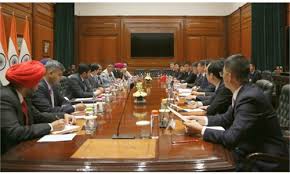China, India reach resolutions on issues concerning the border area: FM

China and India have reached resolutions on issues concerning the border area and China will work with India for the implementation of these resolutions, the Chinese Foreign Ministry said on Tuesday. Chinese experts called on New Delhi to strictly and fully implement the resolutions, which they said are positive for pushing bilateral relations back on track for stable and sustainable development.
Lin Jian, a spokesperson of the Chinese Foreign Ministry, said at a regular press conference on Tuesday that “Over a recent period of time, China and India have reached resolutions on issues concerning the border area following close communication through diplomatic and military channels. China commends the progress made and will continue working with India for the sound implementation of these resolutions.”
Lin Minwang, deputy director at the Center for South Asian Studies at Fudan University, told the Global Times on Tuesday that “undoubtably, this is a very positive signal for the future development of China-India relations.”
The resolutions reached by the two sides marked a breakthrough in resolving the border issues that started in 2020, Lin Minwang said. “In the past, India has always said bilateral ties cannot be normalized if the border issue remained unsolved, but now New Delhi should not use the border issue as a pretext to bar the improvement of the bilateral ties.”
Since the outbreak of border frictions, which were unilaterally provoked by India in 2020, the China-India relations have been deeply affected, as the “China threat” rhetoric and nationalism and hostility against China have been hyped within India, and New Delhi has launched hostile measures and investigations against Chinese firms that operate in India and set obstacles for the people-to-people exchanges between the two countries, experts said.
However, all of these setbacks in the bilateral relations have not changed the fact that India heavily relies on imports from China.
China has emerged as India’s top import source with $56.29 billion worth of inbound shipments during the April-September period of this fiscal, according to the Indian commerce ministry data, the Indian media Business Standard reported last week.
Reuters also said in a report published on September 11 that “India’s push to become a factory titan has hit a snag: to become a credible alternative to China for global firms, it first needs to warm up to its long-time rival.”
An article published in the Washington Post on September 2 also said, “as India has amped up its production of goods like smartphones, solar panels and medicine, the Indian economy itself has become even more dependent on Chinese imports, in particular for the components that go into these products, according to trade figures and economic analysts.”
“The Chinese can help India secure a foothold on the lowest rungs of the global skills ladder. Those rungs are rising: India must jump now,” wrote Ashoka Mody, an economist at Princeton University, in the Hindu. “The breathtaking irony of invoking self-reliance is lost on Indian officials precisely when India’s economic growth increasingly depends on foreign expertise, particularly from China.”
These economic reasons, especially India’s reliance on China, might be the key factors that may drive India to fix its ties with China, said Hu Zhiyong, a research fellow with the Institute of International Relations at the Shanghai Academy of Social Sciences, noting to what extent both sides can fix the damaged ties and boost economic and technological cooperation and trade and even investments depends on India’s implementation of the resolutions about the border issue reached by both sides.
Being cautiously optimistic on the new development, Hu said that it is unlikely that the complicated border issue between China and India would be completely resolved right away, as the latest reached agreement can only ease tension and help resolve the border frictions since 2020 and prevent escalation.
“We should be patient and continue to pay attention to what India will do next,” Hu told the Global Times on Tuesday.





